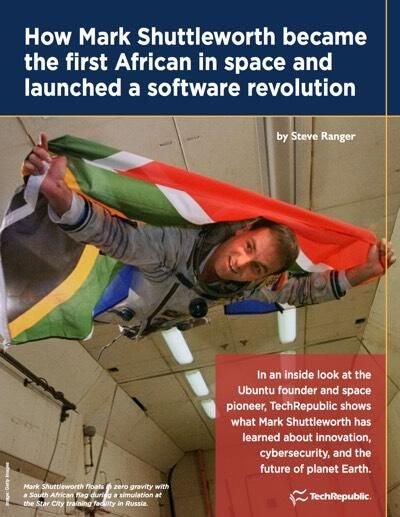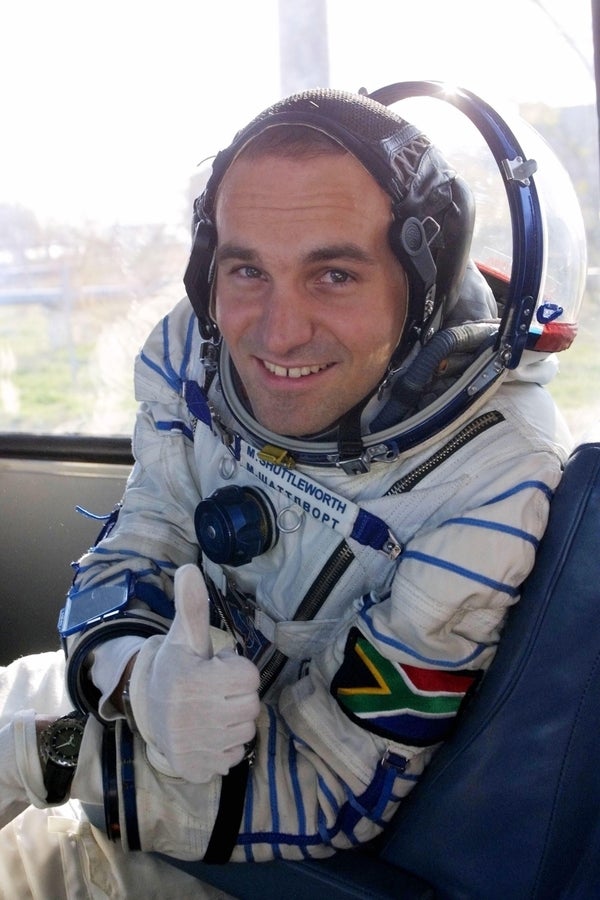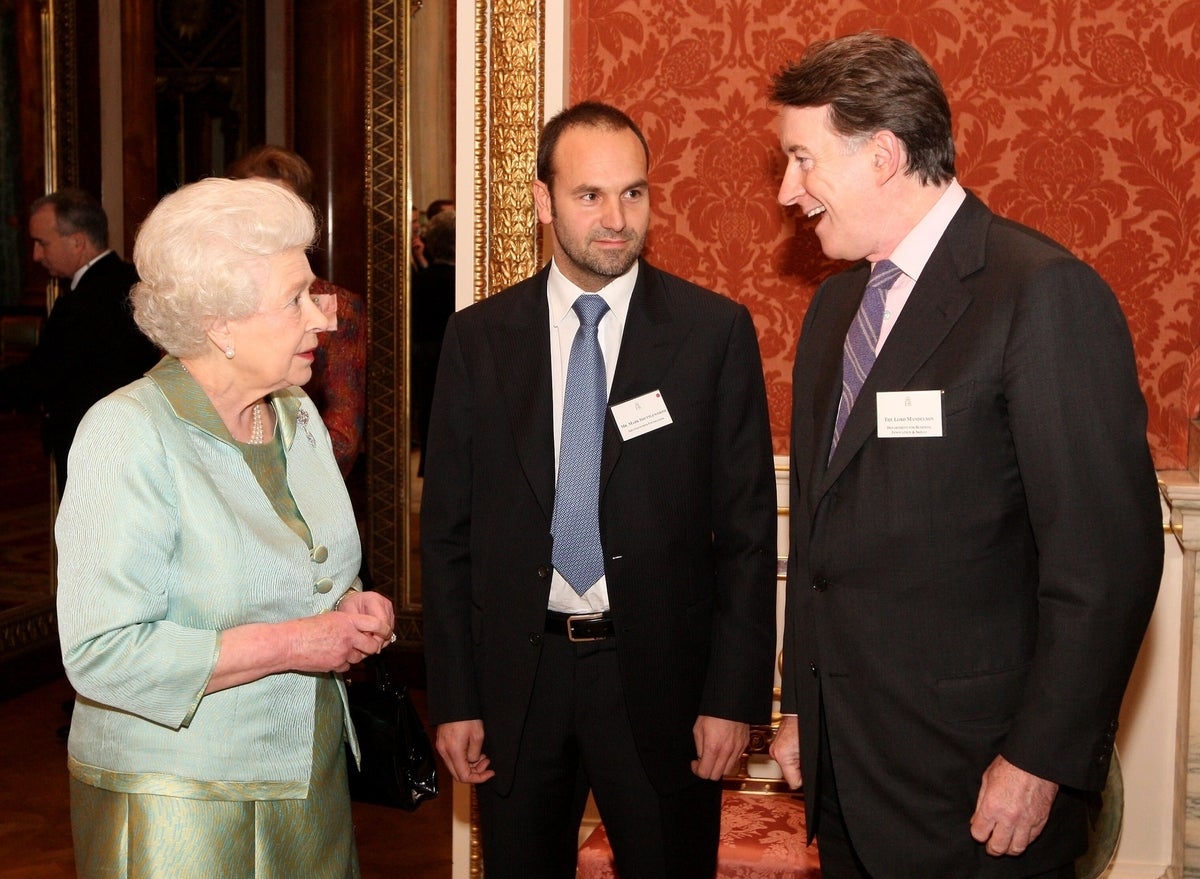I meet Mark Shuttleworth in the café of a cinema in the center of London, which is fitting, because he’s about as close to a movie star as the technology world gets.
Shuttleworth is perhaps best known as the “afronaut.” In 2002, at 28, he became the first African in space–and the second-ever space tourist–after spending millions to fly to the International Space Station as a member of the crew of Soyuz mission TM-34.
But before that, in 1996, he had already founded digital certificate company Thawte, while studying finance and IT at the University of Cape Town, just as the internet age was gaining momentum. Thawte was one of the first companies working on securing internet transactions, and just three years later it was acquired by Verisign for $575 million, making the young Shuttleworth wealthy enough to pay for his trip to space, and much more.
When we meet he’s straight off the plane from New York–he managed to fit in a bit of coding on the flight. But, he’s happy to jump straight into the conversation, and for someone who lists public speaking as one of his dislikes–likes include weightlessness, broadband, Iain M Banks, skinny-dipping, fancy dress, and “flashes of insight”–he’s got a nice turn of phrase, at one point describing the work of software developers as “revolutionary magic.”
It’s clear he sees technology as remaking the world, and while many technology execs try to play down that impact or even dodge their responsibility for those changes, Shuttleworth seems fascinated and energized by it.

“What I’m really interested in is how society changes because technology changes. We see changes in society like democracy, and we think they’re somehow intrinsic. They’re not–they’re a function of technology. What is possible defines what we expect, and what is possible changes because technology changes.
“It’s technology which changes what’s possible in society, so if you want to change society, think carefully about technology,” he says.
“We’re in an age where the status quo gets turned over every couple of years and who’s turning it over? Developers are turning it over. It’s developers who are able to very quickly implement new ideas that are challenging established industries or established business models or established technological platforms,” he says.
So what about that trip to space? Shuttleworth spent a year in training for the flight, eight months of that in Star City, Russia before rocketing off to the ISS.
“For me that wasn’t just about the flight, it was about the training, about the sense of community there. Star City is a very close-knit, small community and an outpost of both historical and futuristic space, so it was fascinating to be there, and fascinating to make friends with people who have made that their career to be right in the thick of that. To launch from the same launchpad that kicked off Sputnik and Gagarin–that was pretty wild,” he says.
Would he go again? “We’re still going to the same places, doing the same science. I think more people should go to space and if I take up one of those seats, then that’s not more people going to space. But I think there will come a time when we are ready to go and push some boundaries, and I might want to be part of that,” he concedes.
In 2000 he founded HBD (Here Be Dragons), an investment company, and created the Shuttleworth Foundation, which funds innovation projects. After running a campaign to promote coding, science, and mathematics in South African schools, he started work on a new grand challenge: creating an open source desktop operating system, called Ubuntu Linux.

While Linux was already used for servers in 2004, it was still very much a minority interest when Shuttleworth gathered a small team of developers from one of the established Linux projects, Debian, and set out to create an easy-to-use Linux desktop.
Shuttleworth did some of his research ahead of launching Ubuntu while on another adventure, this time to Antarctica.
“It wasn’t cause and effect. I didn’t think ‘Gosh, I’d like to do free software, best I go to the South Pole.’ I happened to be interested in going to Antarctica, so I had a couple of weeks on my hands to do some research,” he says. “It’s a long trip by boat.”
The first release of Ubuntu arrived in October 2004 (Ubuntu is an African word meaning “humanity to others” or “I am what I am because of who we all are”). The company behind Ubuntu, Canonical, now has 600 staff, with its headquarters in London.
SEE: How to become a developer: A cheat sheet (TechRepublic)
From the start, the project was driven by an explicitly political declaration of intent, some of which is captured in the first tongue-in-cheek Ubuntu “bug” reported by Shuttleworth that year. The tiny startup wanted to take on tech giant Microsoft and its flagship product, Windows.
“Microsoft has a majority market share in the new desktop PC marketplace. This is a bug which Ubuntu and other projects are meant to fix,” he wrote.
The availability of free open source software had huge potential benefits, Shuttleworth argued, by allowing users to share their collective experience to improve the software as it developed–and to give access to essential software to those who couldn’t otherwise afford it.
“Non-free software leaves users at the mercy of the software owner, and concentrates control over the technology which powers our society into the hands of a few. Additionally, proprietary software stifles innovation, maintains artificial scarcities, and enables malicious anti-features such as DRM, surveillance, and other monopolistic practices. This bug is widely evident in the PC industry,” he wrote.
And the fix? “A majority of the PCs for sale should include only free software,” it concluded.
It’s a pretty grand statement for a startup to make.
“I was a very young guy. I was in a very fortunate position that I could do whatever I wanted and I figured that enabling the next wave of disruptor-innovator entrepreneurs would be the most powerful way I could use the good fortune that I had,” he says.
But there was another reason for the project. Despite the enthusiasm of some developers and the anti-Microsoft pose, Shuttleworth also saw Linux splitting into proprietary versions and struggling free versions.
“I was a developer and I literally watched the free distributions failing. They were unable to make releases, falling behind on the hard stuff. It’s difficult to imagine now but they were really failing,” Shuttleworth says.
He remembers: “We were looking at a scenario where Linux became Windows, which was incredibly exclusionary to the people who I thought were going to make a difference. You don’t get real innovation when you’ve got one organization–you need something that’s more accessible. That motivated me to go in and try to walk this middle ground, between being of an enterprise grade and being universally accessible, which has proven insanely difficult.”
Yet despite the grand ambitions of Shuttleworth and others, Linux-based PC operating systems still remain, at best, a minority interest on the desktop–accounting for about 2% of PCs accessing the internet while Windows still claims a mighty 91%.
And even in the two percent that open sourcers have grabbed, Ubuntu is just one of many different flavours of Linux that fans can choose from. Far from replacing Windows, for most, Linux on a PC remains obscure and hard to use.
Download this article as a PDF (registration required).
Still, three years ago Shuttleworth closed the bug himself, but styled this not as an admission of defeat, but as an unexpected kind of victory. The rise of Android, the Google-developed, Linux-based mobile operating system, he argued, had meant that the rules of the game had changed. Linux might not have won the desktop war, but the PC has been usurped by the smartphone–and Android runs on about 90% of them.
“Android may not be my or your first choice of Linux, but it is without doubt an open source platform that offers both practical and economic benefits to users and industry. So we have both competition, and good representation for open source, in personal computing,” he wrote when closing the bug.
Shuttleworth admits he didn’t spot the way the shift from PC to smartphone would change the game. “For me it’s a really salutary lesson that strength in one era of platform really doesn’t turn into strength in the next era,” he says.
“I think we live in a much healthier world now than we did in 2003, just in terms of the amount of competition, real centers of strength in Amazon and in Google and in Microsoft and in Apple. It’s a very different world and a much healthier world for you, me, and everybody else than we were in 2003.”
And the distinct failure of the Linux desktop to take over the world (the company says there are 40 million Ubuntu desktop users out of somewhere around two billion PCs) hasn’t dented Shuttleworth’s enthusiasm for it.
“First, I think it’s worth celebrating the fact that an open platform has become the de facto platform of innovation. If people are innovating today it’s on Linux, almost universally, and I think that teaches us something about access to talent, the way innovation works best when it is decentralized,” he says.
“The challenge with traditional platforms is that to be allowed to explore an idea, you have to be an employee at the place that controls the platform whereas now with Linux you don’t have to be an employee anywhere to go do something interesting and have it spread. That’s what really is at the heart of that shift.”

Ubuntu didn’t win the PC war for Shuttleworth as he hoped, and nor did it catch the smartphone wave (more on that later). Indeed, Canonical has sometimes been seen as a company that figures out where the big trends are pointing but just can’t capitalize upon them. However, Shuttleworth argues that it has got a pretty good grasp on one of the tech industry’s other big hopes: the cloud, thanks again to developers. Sure, the Ubuntu desktop might not have overtaken Windows, but it may have helped Canonical stay close to those vital developers.
“We saw them going into cloud, so we followed them,” he says.
“I would go all the way back to that original focus on developers. So the Linux desktop is a slightly crazy, harebrained scheme unless you are a Linux developer and so it just turns out that by really thinking about what Linux developers want and giving them something that is secure and reliable and all of those things–easy to use–we’ve won them over to the cause.”
According to Canonical, 70% of the public cloud is running on the server version of Ubuntu. At the same time big enterprise customers–like banks, retailers, and telecoms companies–who want to make their infrastructure as flexible as cloud-based systems are looking at cloud technologies, “and as most of the developers who are hired to do that are Ubuntu developers, we have very strong traction in those groups that are blazing new trails,” Shuttleworth explains.
The cloud version of Ubuntu isn’t what you’d find on a PC or a traditional server, though.
Download this article as a PDF (registration required).
“When people started using the cloud, we had Linux that was designed for servers that would last for ten years. So if you think about it, when you are installing that, it’s going to last 10 years if it takes you 20 minutes to install–well so what? But when you are booting a [virtual machine] every 20 seconds, 10 minutes to install is not going to help. So we just had to do some work to shape the platform, so that you could feed it everything that it needed to just boot dynamically and that way we became the platform that everybody used on the public cloud.”
If the PC is where Ubuntu had its roots and the cloud is where it is flourishing now, Shuttleworth wants the Internet of Things to be its future.
“The vast majority of things that come out of factories that have a little board and a CPU on them are running Linux,” he says.
One problem: until now these devices have effectively become obsolete as soon as they’re deployed. Built on customised hardware and customised hardware, they are impossible to update or secure: a mess with a million different versions of Linux. But now developers want to write software that can run across multiple devices, which means a move back towards standards–and Shuttleworth wants Ubuntu to be that standard.
“Suddenly your Raspberry Pi or your drone or your car’s infotainment system, they all run the same platforms because that way they have access to all of those apps. It turns out Ubuntu is the platform that most developers for a Linux box are comfortable with. So we are really in the middle of that excellent hurricane,” he says.
Shuttleworth wants devices from drones and vending machines, to routers and robots, to run a version of Ubuntu, so that devices can be easily updated and secured and so that developers can write applications that can be run on different devices. If developers can start writing apps for the billions of IoT devices out there that could share the same operating system, then that could develop into a handy revenue stream for them–and for Canonical.
For Shuttleworth the move towards the nascent Internet of Things is also a way to fix one of the big problems with Linux: security.
The biggest denial-of-service botnets today are on Linux devices, he notes: those hard-to-update webcams, Wi-Fi routers, and other devices.
“When I was a 1990s Linux hippie trying to convince people that this thing would work, we said the fact that it was open would make it intrinsically more secure. Well, now we know that’s not true. Now we know that it’s actually not enough to be open,” he says.
What’s more important is the ability to update devices too. “Those botnets are on home routers that are running the same software they were running six years ago, and so they are wide open,” he cautions. “Yes, Linux has achieved incredible things, but at the same time we are now responsible for the state of the world’s infrastructure and that means we own that problem.”
With great power comes great responsibility. Ubuntu Core–Canonical’s version for IoT devices–aims to be tamper-proof and capable of being updated without human interaction. That means, according to Canonical, it can be used to keep all sorts of devices up-to-date that would be impossibly expensive to upgrade otherwise, like sensors on street lamps or that Wi-Fi access point you put on the ceiling of your office and forgot about.
As the digital and physical worlds become more tightly meshed together, software upgrades and security can also become a matter of life and death. “Every single self-driving car you’ve ever heard of is running on Ubuntu, so this is a perfect platform for them,” he claims. We’ve been approached by a couple of them saying, ‘We’ve got this all working in the labs and we’re now planning to take those things out to market’, but they need to provide secure updates.
The IoT market might be tiny for Ubuntu now, but it could be as big a market as the cloud is today, Shuttleworth predicts.
“It took a long time for the big names to get interested in public cloud: for years nobody else was really doing anything in public cloud and it grew slowly as a result. Now it’s everybody. With IoT it’s very clear that it’s an opportunity that lots of people are investing in and it’s ramped much faster. It took three or four years before we had an enterprise customer of our cloud capabilities, whereas we have many enterprise engagements now around this IoT story and it’s just released. Everybody understands it’s something they want to engage with.”
Of course, not only is Ubuntu chasing this dream, but so are much bigger tech companies–including its old sparring partner Microsoft.
Download this article as a PDF (registration required).
“Ultimately this is a developer game and those developers are on Ubuntu. This is a race about software developer talent and I feel very confident that Ubuntu is the platform that the lead developers use every day and care about, and that they’ll carry that forward into the edge of the network,” Shuttleworth insists.
The version of Ubuntu for IoT was actually an offshoot of the work done for the mobile version of Ubuntu. “It’s the fruition of a lot of work we initiated specifically because we had to deliver over-the-air updates to mobile devices,” says Shuttleworth.
There have been a few Ubuntu-powered phones and tablets, but they’ve never sold in big quantities. Probably the most famous was one that never actually happened.
Back in 2013 the company tried to raise $32 million on Indiegogo for a crowdsourced smartphone called the Ubuntu Edge, which would dual boot Android and Ubuntu, with specs to outmatch the then-market leading iPhone 5 and Samsung Galaxy S4–but more importantly would be able to perform as a desktop PC too.
Connect to any monitor and this Ubuntu phone transforms into an Ubuntu PC, with a fully integrated desktop OS and shared access to all files,” the fundraising page promised. But despite early excitement the project failed to take off. Even though it raised an impressive $12.8 million from 24,000 backers, and Bloomberg even put in $80,000, this was only 40% of the target.

“Having that vision and not having the hardware to target it, that was the issue. We thought if we can get people to buy into that idea, then we’ll do it. We raised a lot of eyebrows but we didn’t crack the threshold,” Shuttleworth concedes.
Some saw Ubuntu Edge as a noble failure, while others argued the premise was fundamentally flawed. More recently, Microsoft has also tried to make the same kind of phone-desktop convergence work, also with limited success. Shuttleworth maintains the fundamental concept of convergence remains sound: “The underlying dynamics of Moore’s Law are bringing us into territory where the convergence story becomes real.”
“I don’t think we are more than two or three years away from it across the board. Obviously Microsoft is now completely heads down on that vision, I think there are lots of signs Google is doing exactly the same, merging Chrome and Android, and while it’s more subtle at Apple, I think the intent is pretty clear.”
Canonical is now a dozen years old, even though Shuttleworth describes the company as “a tiny band in a market of giants.”
Despite being formed to tackle Microsoft’s domination of the desktop, the two companies now work together. A recent Canonical press release started “Microsoft loves Linux,” and relations between the old rivals–both of which started on the desktop and both of which now see their future in the cloud–have thawed significantly. In March 2016, the companies announced that some Ubuntu tools would be able to run on Windows 10.
“It’s difficult for people to change but it’s very plausible for organizations to change. It’s a function of leadership and intent. An organization sheds its old ideas and a smart organization reinvents itself, so I would credit Microsoft with making that transition,” he says.
In 2015 Shuttleworth said he was considering taking Canonical public, though more recently he has said that an IPO is not a priority for the company.
But it seems that making money from open source software–from making software and giving it away for free–is hard, even when you have a backer with pockets as deep as Shuttleworth, who has now been supporting the company for more than a dozen years.
The company makes money from selling support to big corporate customers (Ubuntu Advantage) plus systems management tools like Landscape and options like Metal as a Service. Canonical has also tried other ways of making money in the past. In 2012, the company signed a deal which saw Amazon shopping results being integrated into search. Canonical quickly made the “shopping lens” optional after a backlash from customers.
Results for Canonical Group Limited in the UK for the year to 31 March 2015 (the last available) tells at least some of the story. It saw turnover increase £14 to £96 million, and an operating loss of £11 million.
Jay Lyman, research director at analyst house 451 Research, said Canonical still faces the challenge of making money from open source software, although times are changing.
“Ten years ago open source software was more of a novelty, more exotic to the enterprise. Today Linux and other open source software components are very pervasive in enterprise IT. And that’s a dramatic change from where it was years ago.”
That also means companies are willing to pay for support, too. Lyman said Canonical was also one of the first to spot the potential for Linux in the cloud.
“Ubuntu Linux was really the first of the enterprise Linux distributions to embrace the cloud. They were integrating and incorporating support for cloud computing very early on with Ubuntu.”
Part of what makes Canonical different is that it is backed by an individual rather than by venture capital, he says. “Canonical is unique in that respect that they are willing to take some of these risks. They don’t always pay off but it did for them in cloud,” Lyman says.
“At the time that they were integrating cloud there was a lot of skepticism and a lot of talk about how cloud computing was just vapour and not a real market. Well, it turns out that it is a real market in the enterprise and it paid off for them,” he says. “They are a little less risk averse than a VC-backed company would be.”
Getting older has brought one more unexpected problem for Canonical. The first release of Ubuntu was Warty Warthog, after which releases settled into an alphabetical order (Hardy Heron, Intrepid Ibex, Jaunty Jackalope, and so on). That means, while Shuttleworth describes Canonical as “still being hungry,” it’s also now been around long enough to roll through an entire alphabet of releases. In April 2017, Zesty Zapus arrives.
So what comes after that? Shuttleworth laughs, “That is a question to which I have no firm answer as yet. This is our very first version of the Y2K problem, there are lots of potential options, none of them glamorous and in due course we’ll make a call.”
But there’s one point at which Shuttleworth’s optimism about technology falters–when we talk about his trip to space. Like many astronauts, the trip gave Shuttleworth a different perspective on the world.
“It is a very small world and a very fragile one and that is very, very visible from space. You can really see the mess that we are making of the only spaceship that we all share, it’s catastrophically visible,” he says.
“There are just too damn many of us. You can’t deny people the right to a better life and to define that in terms of economic activity; more economic activity has a bigger footprint and there are just too many of us.”
It’s not an issue that can be solved by someone discovering clean energy, he argues. A system like the Earth’s environment needs its complexity to stay stable.
“What is wilderness? Wilderness is buffer, yet we are turning that into rectangles of homogeneity, which removes all of the buffer. So I look at our impact on the Earth as profoundly dangerous because of its homogenizing effect,” he says.
In a dozen years, the role of Ubuntu has changed from a PC operating system to one for phones, cloud servers, and now IoT. Despite its huge impact, Linux still doesn’t–and probably never will–enjoy the same recognition as the big tech brands. Built by a legion of developers, many volunteers, and powering billions of devices, it still remains prominently in the background.
But Shuttleworth’s enthusiasm for Linux remains undiminished as he looks around the cafe. “Pick an industry like entertainment or anything. If you don’t absolutely master Linux you will not disrupt that industry. That’s really fascinating to me. In a sense, it’s invisible and yet if you look at all the people in this room, doing all of the things that they are doing, in 10 year’s time pretty much everything they take for granted will be powered by Linux. And I think that’s pretty fantastic.”
Download this article as a PDF (registration required).
Photo credit for cover image: Getty Images

